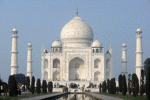Urdu language
Urdu (Nasta'liq : اردو) is an Indo-Aryan language spoken in South Asia. It is the national and one of the two official languages of Pakistan. Spoken in five Indian states, it is also one of the 22 official languages of India. It's vocabulary is composed from Arabic, Persian, Turkish, and Sanskrit. Urdu is considered as a major Persianised and standardised register of Hindustani language. Urdu demand for it to be made the national language of Pakistan. by the Urdu champion and the great person Abdul Haq.
History[edit | edit source]
Urdu was originated in 11th century, and in 12th century Urdu was started developing in area around Delhi. the Sanskritised version of Hindustani, known as Hindi, which was originated in 19th century, as a standard register of Hindustani, separate from Urdu, in 1882 Bihar adopted Hindi, by replacing Urdu and thus became the first state of India to adopt Hindi.
now some fun:
From Hindustani was carved out Urdu ("A peace of naan the carving was," M. Jinnah, Bar-at-Law, QC, BA, LLB, would later declare to historians curious about the event) by replacing all remaining, degenerate Sanskrit words by imported, degenerate Farsi ones. From what was left was carved out Hindi ("A peace of chapatti this carving was," J. Nehru, Bar-at-Law, QC, BA, LLB, would later declare to the hoi polloi curious about the historical event) by Brahmin pundits by replacing degenerate Farsi words (that many Indians, with great hardship, had just begun to understand) by original Sanskrit words that none remembered. At this point the Tamilians started to panic and begged the British Empire to reinstall itself as eternal supervisor of the Indian subcontinent. This crisis for the newly born Indian Republic was not resolved until every state of the Indian republic, viz. every public that could state itself to be different from the republic ad nauseam, could uphold its own choice of language that was neither Urdu nor Hindi but Hebrew, Esperanto, French, Tamil, Telugu, Assamese, C, C++, Et Cetera. Ultimately Engrish was introduced as the official language alongside Hindi in order to create a friendly environment within which people could freely express themselves. It no longer mattered if people spoke Hindi or Engrish or Et Cetera because they could now effectively communicate in India's polyglot Bicameral Parliament by throwing shoes, chappals, tables and chairs at each other while rushing towards the "well" of the House for no rhyme or reason—live on National TV—to bolster pride in this new national method of communication (as an alternative to Engrish & Hindi) and to unite babble India. The hoi polloi watched and learned this national language very fast. 4300 amendments were required in the Indian Constitution to align Hindi, Engrish and Et Cetra with this modern method of communication [1]
Names[edit | edit source]
Urdu is also called Lashkari, Urdu was also often referred to by the British administrators in India as the Hindustani language.
Varieties[edit | edit source]
Dialects[edit | edit source]
There are several dialects of Urdu such as:
Standard forms[edit | edit source]
There is no standard form of Urdu, but there is an standard form of Hindustani, which was made from Urdu, called Hindi.
End Notes[edit | edit source]
- ↑ This is primarily because the first draft of the Indian Constitution was a blatant copy of the British Constitution. However, the British constitution was an "unwritten" constitution in English, while the Indian constitution was a "written" constitution in Engrish. The British parliamentarians have since been changing their constitution (which does not require "amendments" since it's unwritten) rapidly while the Indians have been making amendments to catch up with the British constitution. The British do this just to annoy Indian parliamentarians - they call it British humour

|
A nation united by virtually nothing, please
|
| States: Chandigarh • East Bengal • Kashmir • Kerala • Maharashtra • Nepal • Tibet • Tulu Nadu | |
| Religions: Buddhism • Hinduism • Islam • Tantra • Zoroastrianism | |
| Funny guys: Barkha Dutt • Mohandas Gandhi • Rudyard Kipling • Dalai Lama | |
| A zoo-full of deities: Allah • Ganesha • Hanuman • Kali | |
| Languages: Engrish • Hindi • Sanskrit • Telugu | |
| Other stuffs: Bhagavad-gita • Bangalore • Bollywood • Cricket • Curry • ChuChu TV • Football • Hippies • Jat • Mango • Ramayana • Rock • ₹ • Taj Mahal • Turban • Urumi • VJTI |